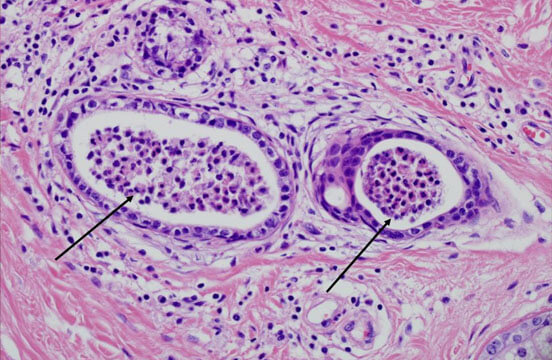Explore frequently asked questions about Hidradenitis Suppurativa (HS), a chronic, inflammatory skin condition impacting the apocrine sweat glands. Recognized by painful, swollen bumps forming clusters, it may progress to abscesses or open sores. While typically found in the armpits, groin, and buttocks, Hidradenitis Suppurativa can also manifest in other areas like the breasts, abdomen, and back. Gain insights into this condition’s symptoms, triggers, and management strategies to better understand and address its impact on your daily life.
HS is a progressive condition, which means it can worsen over time if left untreated. It is also known to cause psychological distress due to physical symptoms, such as pain, itching, and embarrassment due to the appearance of the affected areas.

You may wonder what to expect if you’ve been diagnosed with hidradenitis suppurativa. Here are things to keep in mind:
- HS is a chronic condition that can last for years or even a lifetime. However, with proper treatment, the symptoms can be managed, and the condition’s progression can be slowed.
- Treatment for HS may include topical medications, antibiotics, oral medications, surgery, or a combination of these.
- HS can significantly impact your quality of life, so it’s important to talk to your doctor about your symptoms, treatment options, and support resources.
- It’s vital to take care of yourself and practice good hygiene, as this can help reduce the risk of HS flares.
- It’s also important to find ways to manage stress and keep your emotions in check, as this can also help reduce the risk of flares. You can seek support from a Canadian hidradenitis suppurativa foundation to do this.
Frequently Asked Questions About Hidradenitis Suppurativa
Will Things Get Worse?
HS is thought to be a progressive condition. As a result, over time, it frequently gets worse. A small pimple could turn into a large boil in days or hours. If the boil bursts beneath the skin, infection and inflammation quickly spread, and other lumps appear nearby. One or two weeks may pass between episodes.
The most severe symptoms of HS can be avoided with treatment, and HS can also be kept from worsening. The secret is to start early.
How Often Should You See a Doctor?
How often you visit the doctor will depend on your symptoms and how your body responds to the medication. You might be able to cure minor symptoms on your own. You might need to visit the doctor regularly if you take a drug that must be injected or injected into a vein.
Will You Experience Pain All the Time or Only When It Flares Up?
Depending on the severity of your ailment. Massive, deep lumps or nodules may hurt. You might be unable to sit down or walk normally, depending on their location. Some people only occasionally feel these agonizing lumps when their sickness flares. Yet, the nodes or bumps may never completely go away for some people.
If you experience pain more regularly or only during flare-ups, your doctor can help you manage it. You could buy numbing creams, non-prescription pills, or over-the-counter drugs.
When Will You Get Flare-Ups? Can You Stop Them?
It’s not always easy to foresee HS. Your skin may stay clear for months, or flare-ups may occur every few weeks. Some women find that their breakouts start a few days before their periods. They may vanish if you are pregnant or breastfeeding.
There is no surefire way to put an end to outbreaks. But, they might not repeat as frequently or be as severe if you follow your treatment plan, take any medication your doctor prescribes, and change some aspects of your lifestyle.
Conclusion
A Hidradenitis Suppurativa support group can be a valuable resource for individuals suffering from the condition. It provides a network of people who have experienced similar issues, can offer understanding and support, and can offer advice and suggestions on coping with and managing the condition.
Additionally, having a support group can allow sufferers to connect with others, share their stories, and find strength and hope in each other’s stories. Ultimately, support groups can be an invaluable and indispensable resource for those with HS and can provide an invaluable source of solace and comfort.
Canadian Hidradenitis Suppurativa Foundation is committed to enhancing the lives and management of HS patients by raising awareness and educating dermatologists. We’re here as your Hidradenitis Suppurativa support group. Let us talk today.
